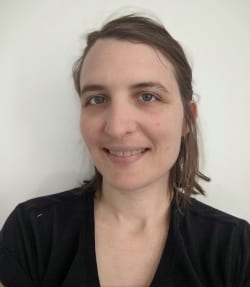Marine Ricau
Friday, May, 21st, 2021 Students
 |
Marine RicauSchool: Graduate School of Engineering Department: Civil and Environmental Engineering Research Interests: Water science and Systems, Public Health, Environmental |
TIE Affiliation
Environmental Research Fellowship
Research
In humanitarian contexts, the common practice for fecal sludge management is to collect, desludge, and then dump untreated sludge into the environment, which causes serious environmental and public health risks. Fecal sludge dewatering geotextiles (FSDG) plants are a promising treatment solution, however their effectiveness in humanitarian contexts still needs to be confirmed. This research aims to assess if FSDG plants are adequate treatment solutions for humanitarian contexts, by evaluating their treatment effectiveness. The objectives of the research are to compare the effectiveness of several geotextiles used in FSDG plants in reducing solid content and pathogens in sludge, as well as to evaluate the effectiveness of FSDG plants currently operated in Cox’s Bazaar, Bangladesh. The results will allow improving the health and dignity of vulnerable populations through the development of recommendations for the design and operation of FSDG plants in humanitarian contexts.
Experience
Marine is a Ph.D. candidate at the Graduate School of Engineering in the Department of Civil and Environmental Engineering. She expects to complete her studies in September 2023. She earned a Masters degree in Environmental Engineering. Before doing her PhD at Tufts, she worked for five years on sanitation projects in humanitarian contexts in Haiti, Lebanon and Myanmar. In Haiti, Marine worked with a municipality to set up a solid waste service for the population. In Lebanon, she worked in a variety of sanitation projects, on design and evaluation. In Myanmar, she supervised sanitation activities for twelve IDP (Internally Displaced Person) camps for a total of 100,000 people.
Current Studies and Future Goals
When asked what she found most meaningful about her field of study, Marine responded with the following: “Sanitation is an essential part of the environmental health field, as it is at the crossroad of public health and environmental considerations, with appropriate sanitation reducing health risks for the population through the reduction of disease transmission, and reducing environmental pollution of soil and water tables with untreated sludge. As diarrheal diseases continue to be a major cause of death worldwide, especially among young children, improving sanitation remains a major solution to reduce the health and environmental burden. However, as humanitarian settings face specific constrains, such as lack of space or political instability, solutions developed in and adapted to high-income countries cannot be applied there, and innovative solutions have to be developed to improve sanitation delivery service in humanitarian contexts. This is a fascinating and quickly developing field of study, that I am glad to be a part of at Tufts University."
When asked what interested her in becoming a TIE Fellow, Marine responded with the following: “The TIE fellowship is a great opportunity to pursue a research project that is meaningful to me. This project aims at assessing if fecal sludge dewatering geotextile (FSDG) plants are adequate treatment solutions for humanitarian contexts. This is essential as it will allow to improve the health and dignity of vulnerable populations by gaining knowledge on sanitation treatment and improving sanitation services in humanitarian contexts. The results will then be used to develop recommendations for the design and operation of FSDG plants in humanitarian contexts and help practitioners decide on the best solution for their context."
After completing her PhD, Marine wishes to continue working with international humanitarian organizations and support them to improve the implementation of their sanitation activities and thus their impact on the health of vulnerable populations.
Fun Facts!
Outside of schoolwork, Marine can be found spending time with friends, playing board games, and making crafts, like bobbin lace and painting
Favorite food/drink: Chips
Favorite movie/TV show: The Good Place
Favorite place you've visited: Ibrahim Maalouf